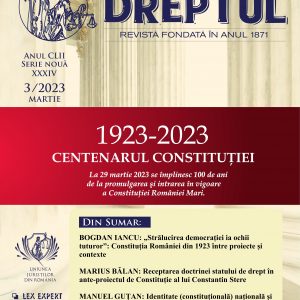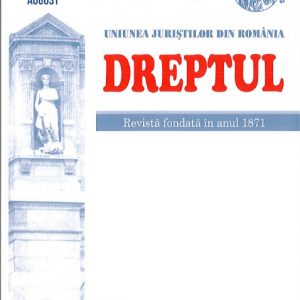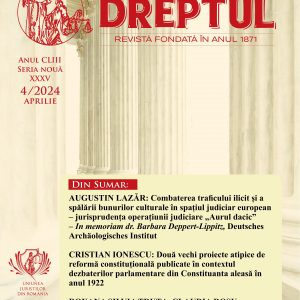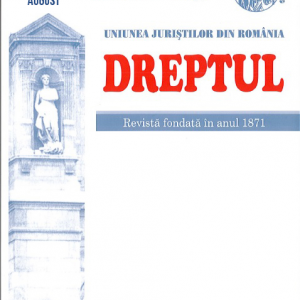-
 An employment contract is decisively characterized by the relationship of subordination between the parties, which distinguishes it from a civil contract. The reclassification of a civil contract as having the legal nature of an employment contract can be done by the labour law court, by the fiscal control body and, more recently, even by the labour inspector. The paper analyzes the criteria under which such reclassification can intervene, what are its traps and its effects. It is finalized with a series of proposals aimed at simplifying the reclassification operation, as well as providing legal certainty.
An employment contract is decisively characterized by the relationship of subordination between the parties, which distinguishes it from a civil contract. The reclassification of a civil contract as having the legal nature of an employment contract can be done by the labour law court, by the fiscal control body and, more recently, even by the labour inspector. The paper analyzes the criteria under which such reclassification can intervene, what are its traps and its effects. It is finalized with a series of proposals aimed at simplifying the reclassification operation, as well as providing legal certainty. -

-
 The supremacy of the Constitution has as main consequence the compliance of the entire law with the constitutional rules. Guaranteeing the respect for this principle, being essential for the state of law, is primarily an attribute of the Constitutional Court, but also an obligation of the legislature to receive through the normative acts adopted, in content and form, the constitutional rules. The entry into force of the new criminal codes has generated a significant case law of the Constitutional Court concerning the verification of constitutionality of some regulations of the Criminal Code and of the Criminal Procedure Code. Through this study we intend to analyze the following more important aspects: a) how the constitutional principles and values have been materialized in some criminal rules and criminal processual rules of the new codes; b) the effects of the decisions of the Constitutional Court in the process of constitutionalisation of the criminal law; c) applying the decisions of the Constitutional Court in the judicial activity, especially those which have established the unconstitutionality of some regulations in the new criminal codes.
The supremacy of the Constitution has as main consequence the compliance of the entire law with the constitutional rules. Guaranteeing the respect for this principle, being essential for the state of law, is primarily an attribute of the Constitutional Court, but also an obligation of the legislature to receive through the normative acts adopted, in content and form, the constitutional rules. The entry into force of the new criminal codes has generated a significant case law of the Constitutional Court concerning the verification of constitutionality of some regulations of the Criminal Code and of the Criminal Procedure Code. Through this study we intend to analyze the following more important aspects: a) how the constitutional principles and values have been materialized in some criminal rules and criminal processual rules of the new codes; b) the effects of the decisions of the Constitutional Court in the process of constitutionalisation of the criminal law; c) applying the decisions of the Constitutional Court in the judicial activity, especially those which have established the unconstitutionality of some regulations in the new criminal codes. -
 Under the study hereby, the author sets under review the institution of “recidivism” in the light of the new Criminal Code. Essentially, highlighting new issues both in relation to the definition and the terms of recidivism, and as regards punishment. Therefore, the terms of recidivism have been amended (limits thereof have been extended), and the sanctioning treatment was simplified. Also, the author notes the fact that the legislature does not make a distinction, in terms of conditions, between post-release recidivism and the post-sentencing recidivism, nor between low recidivism and high recidivism, the old rules being grouped in a single way.
Under the study hereby, the author sets under review the institution of “recidivism” in the light of the new Criminal Code. Essentially, highlighting new issues both in relation to the definition and the terms of recidivism, and as regards punishment. Therefore, the terms of recidivism have been amended (limits thereof have been extended), and the sanctioning treatment was simplified. Also, the author notes the fact that the legislature does not make a distinction, in terms of conditions, between post-release recidivism and the post-sentencing recidivism, nor between low recidivism and high recidivism, the old rules being grouped in a single way. -
 This study examined in a comparative manner the provisions of the Council Framework Decision 2008/675/JHA of 24 July 2008 compared to the Romanian internal provisions related to taking into consideration the criminal convictions decided in another European Union Member State, in the circumstances in which in another Member State a new criminal lawsuit is being initiated against the same individual, but for different facts. The investigation is important since the above mentioned European normative act is classified in the broad range of measures taken for the purpose of the harmonization of laws in the field of judicial cooperation in the criminal matter within the Member States, and the Romanian laws have not been adjusted yet to the European legislative system. Based upon the investigation carried out by the authoress, it results that both the examined European normative act and the internal laws in the matter have certain lacks and for this reason their amendment and supplement is required. The essential contribution of the study shall consist in the examination of certain judicial rules and the identification of certain situations which have to be regulated either by supplementing the European normative act, or by the adoption of another instrument, the same situation being valid as regards the Romanian laws, as well.
This study examined in a comparative manner the provisions of the Council Framework Decision 2008/675/JHA of 24 July 2008 compared to the Romanian internal provisions related to taking into consideration the criminal convictions decided in another European Union Member State, in the circumstances in which in another Member State a new criminal lawsuit is being initiated against the same individual, but for different facts. The investigation is important since the above mentioned European normative act is classified in the broad range of measures taken for the purpose of the harmonization of laws in the field of judicial cooperation in the criminal matter within the Member States, and the Romanian laws have not been adjusted yet to the European legislative system. Based upon the investigation carried out by the authoress, it results that both the examined European normative act and the internal laws in the matter have certain lacks and for this reason their amendment and supplement is required. The essential contribution of the study shall consist in the examination of certain judicial rules and the identification of certain situations which have to be regulated either by supplementing the European normative act, or by the adoption of another instrument, the same situation being valid as regards the Romanian laws, as well. -
 Puțini sunt termenii din vocabularul științelor politice care să fi primit atât de multe definiții și caracterizări, de-a lungul timpului, cum este democrația. Fragmentul din Declarația Universală a Democrației pe care vi-l propun reflecției surprinde două aspecte ale termenului de democrație: unul instituțional, raportat la constituirea prin proceduri electorale democratice a instituțiilor reprezentative ale unui stat, la nivel național și local, și altul funcțional, raportat la puterea reală a poporului și mijloacele eficiente de care acesta poate dispune pentru a contribui, desigur, prin reprezentare, la activitatea legislativă și de control asupra acțiunilor Guvernului. Dacă primul aspect este relativ ușor de realizat, deși cunoașteți dovedite fraude electorale la nivel central și local, cel de-al doilea merită o atenție mai specială, întrucât nu cred că există un cetățean-alegător, grupuri de cetățeni-alegători, care să fie pe deplin convinși că sunt reprezentați, în mod real, în activitatea legislativă și, mai ales, în exercitarea funcției Parlamentului de control parlamentar.
Puțini sunt termenii din vocabularul științelor politice care să fi primit atât de multe definiții și caracterizări, de-a lungul timpului, cum este democrația. Fragmentul din Declarația Universală a Democrației pe care vi-l propun reflecției surprinde două aspecte ale termenului de democrație: unul instituțional, raportat la constituirea prin proceduri electorale democratice a instituțiilor reprezentative ale unui stat, la nivel național și local, și altul funcțional, raportat la puterea reală a poporului și mijloacele eficiente de care acesta poate dispune pentru a contribui, desigur, prin reprezentare, la activitatea legislativă și de control asupra acțiunilor Guvernului. Dacă primul aspect este relativ ușor de realizat, deși cunoașteți dovedite fraude electorale la nivel central și local, cel de-al doilea merită o atenție mai specială, întrucât nu cred că există un cetățean-alegător, grupuri de cetățeni-alegători, care să fie pe deplin convinși că sunt reprezentați, în mod real, în activitatea legislativă și, mai ales, în exercitarea funcției Parlamentului de control parlamentar. -
 In this study the authors examine the issue regarding the ways to determine lineage and the recognition of the child (art. 408 and art. 415 and the following of the new Romanian Civil Code - Law No. 287/2009, republished on July 15, 2011 and entered into force on October 1st, 2011) noting the differences in relation to the previous regulation (the Family Code in force from February 1st, 1954 until September 30, 2011); in this context, on the one hand, the positive aspect of the new regulations is highlighted, and on the other hand, a series of lex ferenda proposals are also being carried out.
In this study the authors examine the issue regarding the ways to determine lineage and the recognition of the child (art. 408 and art. 415 and the following of the new Romanian Civil Code - Law No. 287/2009, republished on July 15, 2011 and entered into force on October 1st, 2011) noting the differences in relation to the previous regulation (the Family Code in force from February 1st, 1954 until September 30, 2011); in this context, on the one hand, the positive aspect of the new regulations is highlighted, and on the other hand, a series of lex ferenda proposals are also being carried out. -

-
 In order to achieve the objective of free circulation of civil and commercial judgments, as part of the process of judicial cooperation in civil matters, it was adopted the Regulation (EU) No 1215/2012 of the European Parliament and of the Council of 12 December 2012 on jurisdiction and the recognition and enforcement of judgments in civil and commercial matters which shall apply only to actions brought, to authentic instruments formally drawn up or registered and to court settlements approved or concluded on or after 10 January 2015. In spite of the fact that the Council Regulation (EC) No 44/2001 of 22 December 2000 which regulated the same matters, has significantly contributed to the development of an area of the free circulation of judgments, certain differences between national rules governing jurisdiction and recognition of judgments have been constantly hindering the effectiveness of the access to justice of the Union’s members. In regard to such difficulties, the Regulation (EC) No 44/2001 shall be superseded by Regulation (EU) No 1215/2012 whose provisions are aimed at unifying the rules of conflicts of jurisdiction in civil and commercial matters and at ensuring rapid and simple recognition and enforcement of judgments given in a Member State. For that purpose, the new Regulation (EU) No 1215/2012 has brought, in the matters of recognition and enforcement, not only necessary clarifications but also substantial changes, such as the exclusion of the requirement of a declaration of enforceability. Moreover, a short analysis of its provisions is required regarding several aspects, such as the refusal of recognition and enforcement, the applicable procedure, the transitional provisions and the circumstances in which Regulation (EC) No 44/2001 shall continue to apply even after 10 January 2015.
In order to achieve the objective of free circulation of civil and commercial judgments, as part of the process of judicial cooperation in civil matters, it was adopted the Regulation (EU) No 1215/2012 of the European Parliament and of the Council of 12 December 2012 on jurisdiction and the recognition and enforcement of judgments in civil and commercial matters which shall apply only to actions brought, to authentic instruments formally drawn up or registered and to court settlements approved or concluded on or after 10 January 2015. In spite of the fact that the Council Regulation (EC) No 44/2001 of 22 December 2000 which regulated the same matters, has significantly contributed to the development of an area of the free circulation of judgments, certain differences between national rules governing jurisdiction and recognition of judgments have been constantly hindering the effectiveness of the access to justice of the Union’s members. In regard to such difficulties, the Regulation (EC) No 44/2001 shall be superseded by Regulation (EU) No 1215/2012 whose provisions are aimed at unifying the rules of conflicts of jurisdiction in civil and commercial matters and at ensuring rapid and simple recognition and enforcement of judgments given in a Member State. For that purpose, the new Regulation (EU) No 1215/2012 has brought, in the matters of recognition and enforcement, not only necessary clarifications but also substantial changes, such as the exclusion of the requirement of a declaration of enforceability. Moreover, a short analysis of its provisions is required regarding several aspects, such as the refusal of recognition and enforcement, the applicable procedure, the transitional provisions and the circumstances in which Regulation (EC) No 44/2001 shall continue to apply even after 10 January 2015. -
 The procedure of payment order has been regulated as a synthesis, but also as a reformation of the two previous procedures materialized in the Government Ordinance No 5/2001 on the procedure of the payment summons and the Government Emergency Ordinance No 119/2007 on the measures for combating the delay of the performance of the payment obligations resulting from the contracts between professionals. In its legislative work, by the new Civil Procedure Code, the legislator has not only achieved a fusion between the two normative acts, but it has also inserted novelty legislative solutions, bringing numerous amendments to the procedure and following its adjustment to the current legal, social and economic realities, in the attempt to harmonize the Romanian legislation with the European one. This study makes a detailed analysis of the nature of the procedure of payment order, of the characters and of the way it was conducted within the current normative framework, as well as of the vast judicial practice, by identifying the novelty elements of the procedure regulated by the new Civil Procedure Code, which – beyond the guaranteed additional accessibility and efficiency – require clarifications and specifications.
The procedure of payment order has been regulated as a synthesis, but also as a reformation of the two previous procedures materialized in the Government Ordinance No 5/2001 on the procedure of the payment summons and the Government Emergency Ordinance No 119/2007 on the measures for combating the delay of the performance of the payment obligations resulting from the contracts between professionals. In its legislative work, by the new Civil Procedure Code, the legislator has not only achieved a fusion between the two normative acts, but it has also inserted novelty legislative solutions, bringing numerous amendments to the procedure and following its adjustment to the current legal, social and economic realities, in the attempt to harmonize the Romanian legislation with the European one. This study makes a detailed analysis of the nature of the procedure of payment order, of the characters and of the way it was conducted within the current normative framework, as well as of the vast judicial practice, by identifying the novelty elements of the procedure regulated by the new Civil Procedure Code, which – beyond the guaranteed additional accessibility and efficiency – require clarifications and specifications. -
 Cititorii Dreptului au luat cunoștință de proiectul de lege relativ la noua modificare a legii Curții de Casație, în scopul reînființării recursului direct în materie de contencios administrativ, în expunerea de motive a d-lui M. Cantacuzino, ministrul justiției, ce am distribuit în supliment. Publicăm aici și raportul d-lui Petre Missir, care este un document luminos asupra legii propuse, aflată în discuția Senatului.
Cititorii Dreptului au luat cunoștință de proiectul de lege relativ la noua modificare a legii Curții de Casație, în scopul reînființării recursului direct în materie de contencios administrativ, în expunerea de motive a d-lui M. Cantacuzino, ministrul justiției, ce am distribuit în supliment. Publicăm aici și raportul d-lui Petre Missir, care este un document luminos asupra legii propuse, aflată în discuția Senatului. -
 The article analyzes the cassation recourse, which is an extraordinary judicial remedy in the criminal trial, a reformative and devolutive judicial remedy, in principle a non-suspensive of enforcement and extensive judicial remedy. The purpose of the cassation recourse is to ensure a uniform practice at the level of the entire country. In order to achieve this purpose, the legislator has expressly provided the reasons for which a cassation recourse may be promoted, the jurisdiction for settlement, the subjects for which the possibility to exercise the judicial remedy is recognized and the solutions which the court can pronounce. The usefulness of the cassation recourse is fully emphasized, given the fact that the recourse would no longer exist within the Romanian criminal procedure system subsequently to the entry into force of the new Criminal Procedure Code.
The article analyzes the cassation recourse, which is an extraordinary judicial remedy in the criminal trial, a reformative and devolutive judicial remedy, in principle a non-suspensive of enforcement and extensive judicial remedy. The purpose of the cassation recourse is to ensure a uniform practice at the level of the entire country. In order to achieve this purpose, the legislator has expressly provided the reasons for which a cassation recourse may be promoted, the jurisdiction for settlement, the subjects for which the possibility to exercise the judicial remedy is recognized and the solutions which the court can pronounce. The usefulness of the cassation recourse is fully emphasized, given the fact that the recourse would no longer exist within the Romanian criminal procedure system subsequently to the entry into force of the new Criminal Procedure Code.
